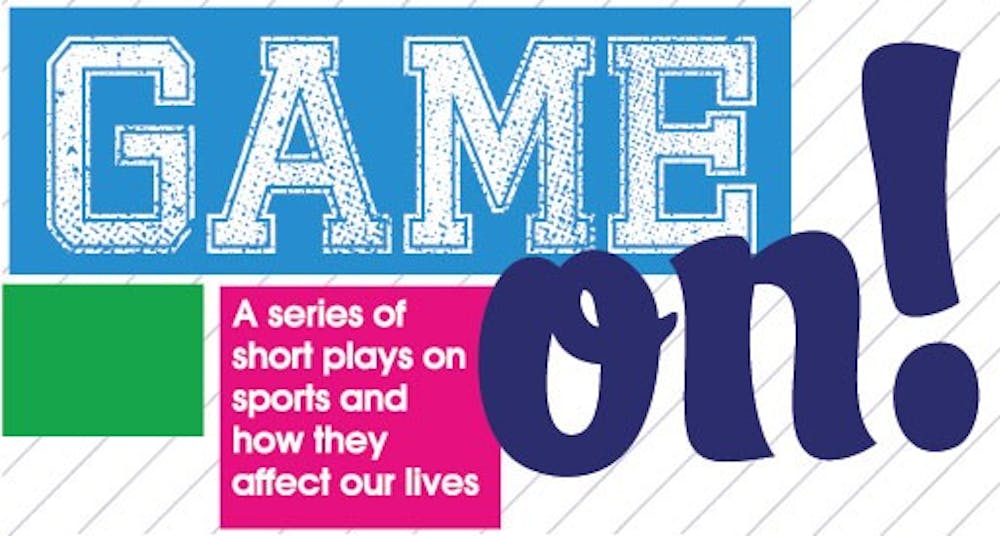
(HANNAH MILLER | The Miami Student)
What does every sport have in common? Competition. Whether it's tetherball in the fourth grade, figure skating, tennis, horse racing or extreme sports, each has a competitive nature. Miami University's Department of Theater will debut Game On! starring 20 cast members who play more than 100 different characters. Composed of 19 short plays, Game On! will expose the beauty and ugliness of competition in a funny and thought-provoking way.
Visiting assistant professor Andy Gibb is the director.
"If you focus on it like that, then not only can you connect all of the different pieces, then it also becomes a series of stories about human beings," Gibb said.
The play opens with first-year Lacey Mendenhall singing the national anthem, just as most sports would begin a game. As the crowd attempts to sing along, we sense the first taste of the play's witty nature. For the next 90 minutes, the cast unveils the competitiveness behind every sport.
Game On! is Gibb's first time directing at Miami. Gibb has tried to emphasize the theme of competition throughout the play because he does not want the focus to be about sports.
"If you make it about sports, then the danger is that it becomes a commentary on institutions," Gibb said.
At Miami, he is not interested in making critical comments about sports institutions.
"The athletic department (at Miami) is one example of what college athletics should be," Gibb said.
The stage manager for Game On!, Kristen LaViscount, a junior theater major and arts management minor, thinks Game On! will appeal to the Miami audience.
"Everyone likes to compete," LaViscount said.
Enjoy what you're reading?
Signup for our newsletter
LaViscount believes everyone is secretly competitive and the audience will relate to the individual plays. LaViscount said the most inspiring short play in this show is the one written by Jacqueline Smith, a Miami playwright whose play is being featured in Game On! Smith's play is the only one that is about a college athlete.
"I think she really did a good job of trying to bring in a lot of the aspects of sports," LaViscount said.
Gibb thinks this play will appeal to the undergraduate audience because it is fast-paced and funny. He said it would appeal to students because it is about people that are around the audience's age. Another appealing factor is the free T-shirts that will be thrown into the audience during one of the short plays.
"I hope that everyone will enjoy it and take away from it all of the hard work that all of the actors have put into it," LaViscount said.
The set and costumes are elaborate because of the 19 individual scenes. With so many scene changes, it is important they move quickly and smoothly. Therefore, a major component of the set is the revolving deck. Much of the set was built at Miami, and many of the costumes were designed and made on campus. The costumes are very intricate and had to be made to aid the actors in their quick changes, according to Gibb.
For instance, the snowboarding costumes were bought and then deconstructed so they could be remade in a way that would allow the actors to rip them off easily on stage. Miami junior Chelsea Skalski has four quick changes in the first act alone.
Skalski's most prominent character is her role as a sportscaster with Jon Kovach. Skalski said the characters serve as the conscience of the show, beginning and ending the production.
While the set and costumes were being made, the cast was busy rehearsing six nights a week for four hours. Along with memorizing lines and blocking scenes, the actors had to develop each of the different characters.
"It was really important for me to find actors who had versatility to play several different types of roles," Gibbs said of casting the show.
Some characters display the positive behavior as a result of competition while others portray the negative. Gibb said it is important for actors to not judge their characters because they would not portray them correctly.
Mendenhall said she enjoyed developing her characters.
"(I was) feeling the emotions rather than acting them," Mendenhall said.
She credits Gibb for teaching her acting techniques that made her think about her characters in ways she had never learned in her 14 years of acting.
The cast also received help from Professor Julia Guichard from the Department of Theater. Guichard serves as a vocal coach to the cast and tries to make the dialogue clear and understandable. Before one rehearsal, she had the cast do a cue exercise in which one actor would recite any of his or her lines while the rest of the cast would await an opportunity to jump in the dialogue with any of their lines. The goal of this exercise was to practice jumping in on cues.
After weeks and countless hours rehearsing, the cast has developed relationships with each other and their director.
"We all mesh well together," Mendenhall said.
LaViscount hoped they would.
"I hope that they gain a positive theater experience ... I hope they do get a sense of team and camaraderie out of it," LaViscount said.




